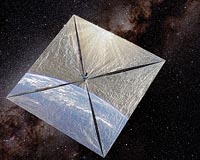 |
Moscow, Russia (XNA) Nov 16, 2009 President Dmitry Medvedev says Russia will prioritize the development of nuclear energy, especially the use of nuclear technology in spacecraft. Medvedev made the announcement Thursday during his annual address to the Federal Assembly. This was not the first time that Russia has suggested the development of nuclear-powered spacecraft. Anatoly Perminov, the head of Federal Space Agency Roscosmos, said last month that the agency has planned to develop spacecraft with a megawatt-class nuclear power set. He said the project would advance Russia's astronautic technology to a world-leading level. The project, he said, also would greatly reinforce the performance of Russia's new manned spacecraft while decreasing energy consumption. Perminov said the draft design of the spacecraft would be finished by 2012, and at least 17 billion rubles (more than 580 million U.S. dollars) were needed for further development over the next nine years. "This project is very serious, to which the government must lend financial support," Medvedev said. Russian astronautic experts have been actively discussing the use of nuclear technology in spacecraft's power systems for a while. Vitaly Lopota, president and chief designer of Russia's Energia Aerospace Corporation, said at an academic conference on aerospace in late October that given the current space technology, the only possible way to implement the exploration of Mars and the entire solar system would be by using nuclear powered spacecraft. Lopota believed Russia is capable of building nuclear energy modules based on megawatt-class nuclear reactors. "In fact, we have already mapped out several schemes for the use of nuclear reactors," he said. Lopota said nuclear energy technology could be first tried on satellites, then on cargo spaceships. Manned spacecraft with nuclear power sets could be built and sent to Mars and other planets in the solar system. Anatoly Koroteyev, president of the Russian Academy of Astronautics, also affirmed the construction of nuclear-powered spacecraft. He said they are practical and feasible. Meanwhile, Koroteyev emphasized that a definite timetable should be fixed to implement such plans. For instance, he said, the relevant design work should be completed by 2012, the actual nuclear power device should be developed by 2015, and the spacecraft should be put into service by 2018. "If we really do hope to bring the development of astronautics into a new stage, and to solve every problem ranging from deep space exploration to daily life on Earth, then it is completely necessary to implement such projects," he said.
Source: Xinhua News Agency Share This Article With Planet Earth
Related Links Federal Space Agency Roscosmos Space Tourism, Space Transport and Space Exploration News
 Planetary Society To Sail Again With LightSail
Planetary Society To Sail Again With LightSailPasadena CA (SPX) Nov 10, 2009 "We're back!" said Louis Friedman, Executive Director of The Planetary Society. "With an even more ambitious solar sail program than our last venture." The Planetary Society has announced LightSail, a plan to sail a spacecraft on sunlight alone by the end of 2010. The new solar sail project, boosted by a one-million-dollar anonymous donation, was unveiled at an event on Capitol Hill in ... read more |
|
| The content herein, unless otherwise known to be public domain, are Copyright 1995-2009 - SpaceDaily. AFP and UPI Wire Stories are copyright Agence France-Presse and United Press International. ESA Portal Reports are copyright European Space Agency. All NASA sourced material is public domain. Additional copyrights may apply in whole or part to other bona fide parties. Advertising does not imply endorsement,agreement or approval of any opinions, statements or information provided by SpaceDaily on any Web page published or hosted by SpaceDaily. Privacy Statement |